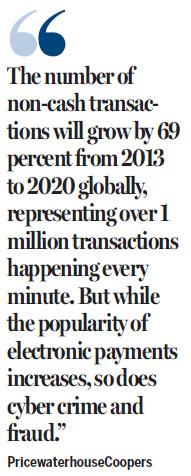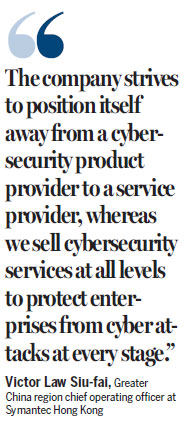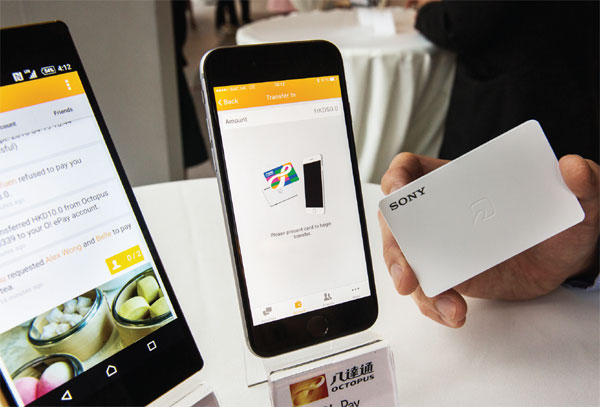Mobile money on the move: Businesses held to ransom
Updated: 2016-09-14 07:04
By Oswald Chan in Hong Kong(HK Edition)
|
|||||||
|
An Octopus card reader is held next to smartphones displaying the O!ePay mobile payment service operated by Octopus Cards. Octopus Cards is among the many local companies gearing up to grab a slice of the burgeoning e-payment market share. Billy H.C. Kwok / Bloomberg |
With mobile payment systems being the "in thing" in Hong Kong, so is cyber crime and fraud.
Mobile payment operators have been forced to go the extra mile in upgrading their cybersecurity technology to accord consumers the protection they need.
Last month, the Hong Kong Monetary Authority (HKMA) granted the first batch of stored value facility (SVF) licenses to five local operators - Alipay Financial Services (HK), HKT Payment, Money Data, TNG (Asia) and Octopus Cards - which, respectively, provide e-wallet services through Alipay, Tap & Go, WeChat Pay, TNG Wallet and O!ePay.
The second batch of such licenses will be issued in mid-November this year. With the new regulatory SVF regime implemented a year ago, the one-year transition period for market operators is due to expire in two months. From November this year, all local SVF operators have to be licensed.
"We adopt a risk-based and technology neutral approach," HKMA Chief Executive Norman Chan Tak-lam told the Treasury Markets Summit 2016 earlier this month.
"Without compromising consumer and investor protection, we would endeavor to see through the nature and magnitude of the risks involved in a financial transaction or product without positive or negative discrimination on whether a new technology is used," he said.

Gartner - a research and advisory firm providing information technology - expects worldwide merchandise purchases using mobile devices to reach more than $400 billion by 2018, accounting for 44 percent of total mobile payment transactions - up from 35 percent in 2013.
Taiwan-based analyst firm TrendForce predicts that global consumers will spend $620 billion through mobile transactions this year, representing a 37.8-percent, year-on-year growth over 2015. By 2019, the value of total mobile payments is expected to hit $1.08 trillion.
Hong Kong's robust financial technology infrastructure and high mobile phone penetration rate entice various mobile payment solution providers from Hong Kong, the Chinese mainland and overseas to establish their footprints in the lucrative mobile payment market.
Apple Pay - the mobile payment solution designed by Apple Inc - launched services in Hong Kong in July this year, with consumers being able to utilize various models of iPhone, iPad and Apple Watch to access mobile payment services at various retail outlets.
Same-league competitor South Korea-based Samsung Electronics started its Samsung Pay system in South Korea and the United States for its Samsung Galaxy S6 and Galaxy S6 edge mobile devices. The conglomerate plans to expand the service to other regions, including Europe and the Chinese mainland.
Mainland e-commerce giant Alibaba Group's Alipay also debuted in Hong Kong earlier this year, while competitor Tencent Holdings launched its "WeChat Wallet" service about the same time.
Local companies are also gearing up to grab a slice of the market share. Following HKT's launch of its Tap & Go mobile payment app in mid-2015, Octopus Holdings' subsidiary Octopus Cards unveiled its O!ePay Octopus network-based mobile payment service in April this year.
"The number of non-cash transactions will grow by 69 percent from 2013 to 2020 globally, representing over 1 million transactions happening every minute. But while the popularity of electronic payments increases, so does cyber crime and fraud," warns auditing firm PricewaterhouseCoopers (PwC).
It says cybersecurity will remain an area where traditional payment companies retain strong potential to add value and compete with new entrants.
Symantec Hong Kong - the local unit of global cybersecurity services provider Symantec - has also warned that cyber network crimes involving mobile payment services are on the rise in Hong Kong.

Most of the cyber crimes involving mobile payment solution providers occur when hackers utilize ransom software to infect mobile payment solution apps to secure ransom money.
"Last year was a record year with 100 new ransom software types being identified, compared with 77 cases in 2014, an increase of nearly 30 percent," says Victor Law Siu-fai, Greater China region chief operating officer at Symantec Hong Kong.
Mobile security service provider F5 Networks Hong Kong is optimistic about the growth of the mobile security market as demand climbs.
"When more people adopt mobile payment solutions, the issue of security will emerge as more hackers want to make money through hacking information," F5 Networks Hong Kong's managing director Juni Yan Yuk-ping tells China Daily.
"This has forced financial institutions, such as banks, insurers and brokerage firms, to buy mobile security services."
The rise in cyber network ransom provides an opportunity for Symantec Hong Kong to transform its business model.
"The company strives to position itself away from a cybersecurity product provider to a service provider whereas we sell cybersecurity services at all levels to protect enterprises from cyber attacks at every stage," says Law.
According to a Symantec Hong Kong survey on cyber ransom crimes, businesses have become the primary target of online hackers as 43 percent of ransomware infections occur inside organizations. The average ransom demand currently stands at HK$5,269 ($679.7).
Hong Kong ranked as the 25th ransomware infection destination in the world between January last year and April this year, with 2,714 infections reported during the period, according to the survey.
oswald@chinadailyhk.com
(HK Edition 09/14/2016 page9)
